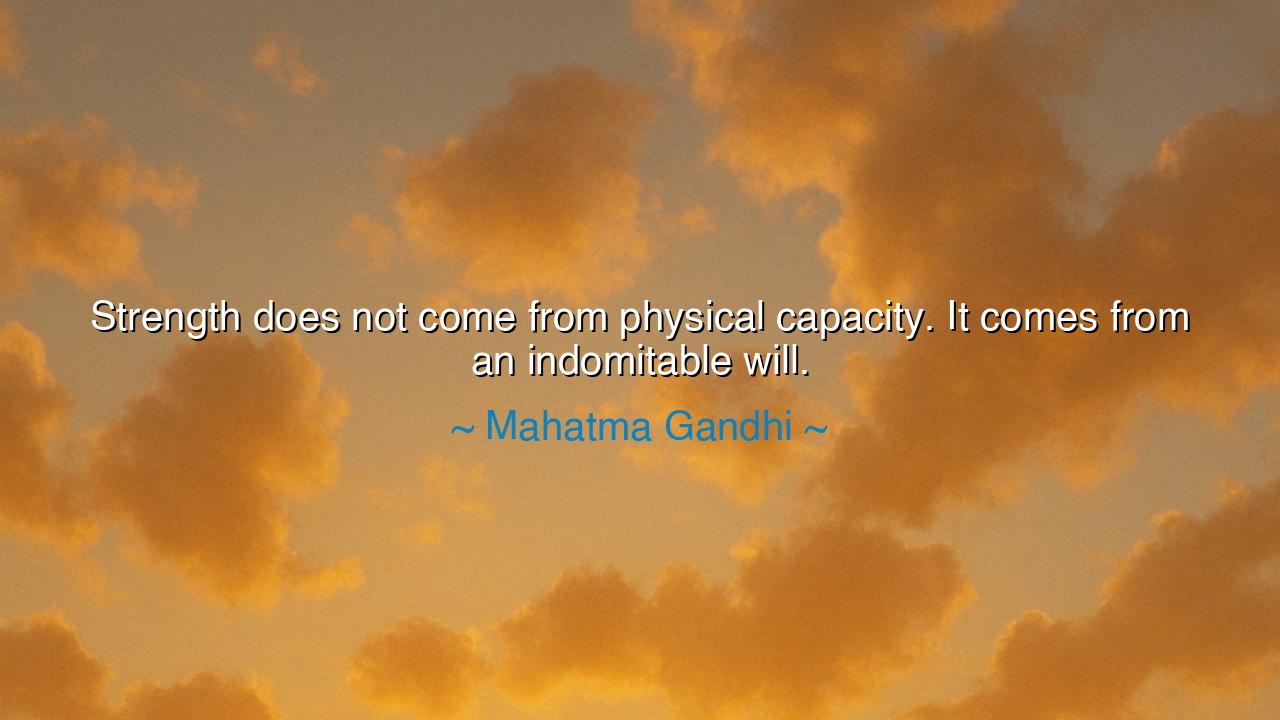
Strength does not come from physical capacity. It comes from an






Mahatma Gandhi, the frail figure who stood mightier than empires, once declared with the clarity of eternal truth: “Strength does not come from physical capacity. It comes from an indomitable will.” In these words, he overturned the world’s common understanding of strength. For many have believed that power rests in muscle, in armies, in the weight of weapons and the force of bodies. Yet Gandhi, who wielded no sword and commanded no battalion, revealed that true strength is born not of flesh, but of the spirit—a will that refuses to bend, even when every outward force seeks to crush it.
When he speaks of physical capacity, Gandhi does not deny its worth, but he strips it of its false crown. Physical might fades with age, it is broken by injury, and it is limited by nature. But the indomitable will—the inner fire of conviction, the steadfast spirit that refuses surrender—this can outlast hunger, outface armies, and endure prisons. It is the strength of the soul, greater than the strength of the body, that moves the world.
Gandhi’s own life is the most radiant example of his words. He faced the British Empire, the greatest colonial power of his age, armed with nothing but the will of nonviolent resistance. His frail frame could not overpower even a single soldier in combat, yet his spirit stirred millions to rise, to march, to endure imprisonment, and to suffer beatings without striking back. Through his unbreakable will, the chains of a vast nation were shattered. He proved before the eyes of the world that true strength lies not in force, but in the resolve to endure without yielding.
History echoes this truth in countless lives. Consider Helen Keller, both blind and deaf from infancy. By physical measure, her capacities were limited. Yet her will, her indomitable determination to learn, to speak, to inspire, lifted her from silence and darkness into a life of profound influence. She became a teacher to kings and the voice of millions, not because of her body, but because of her will. Like Gandhi, she revealed that the greatest strength is found not in muscle, but in spirit.
The deeper meaning of Gandhi’s words is that the human will, once set upon a noble path, can overcome every barrier. The body grows weary, but the will renews itself. The flesh may be beaten, but the will can rise unbroken. Armies may occupy lands, but they cannot occupy the conscience of a people who have chosen to resist with courage. This is why empires fall before the will of the oppressed, and why the smallest individual, if filled with indomitable resolve, can reshape history.
The lesson, then, is clear: cultivate your will. Do not measure yourself by your physical limits, your wealth, or your circumstances. Measure yourself by the strength of your spirit—your ability to persist when others falter, to hold to truth when others compromise, to endure suffering without surrender. It is this will that builds nations, that inspires movements, that allows an ordinary soul to rise into greatness.
Practically, this means: train your will as a warrior trains his body. Begin with small acts of discipline—rise early, master your anger, keep your word, persist in your duties. Each act strengthens the muscle of the spirit. When great trials come—and they will—you will then stand firm, not because of your physical might, but because of the unbreakable will you have forged within.
So let us remember Gandhi’s eternal wisdom: strength does not come from physical capacity, but from an indomitable will. Flesh may weaken, walls may fall, but the will endures. It is the torch passed from one generation to another, the power that transforms suffering into freedom, and frailty into greatness. Guard it, nurture it, and let it burn within you—for with it, you are stronger than any empire, and with it, you may shape the destiny of the world.






AAdministratorAdministrator
Welcome, honored guests. Please leave a comment, we will respond soon